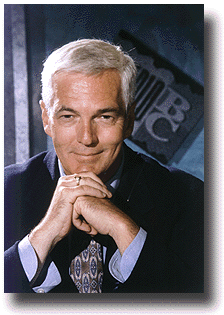
George Orr - BCIT
Broadcast Program graduate; CKNW radio and TV reporter for both BCTV and CBC
Vancouver; editor/producer CBC Television Vancouver; public affairs host
Knowledge Network; Jack Webster Foundation award for broadcast journalism 2001;
recipient 2nd Jack Webster Foundation Telemedia
Fellowship for Broadcast Journalists 2002; instructor Broadcast Journalism
British Columbia Institute of Technology; independent film producer
***
1996 The
George Orr is
talking about a passion close to his heart. The daily news business, he says,
is about exploiting conflict, seizing on the crisis of the moment, chewing it
up and spitting it out in easily digestible sound bites. Orr, a professor of
broadcast communications at the B.C. Institute of Technology and a 20-year
veteran of the news (first CKNW, then BCTV, then, for nine years, CBC-TV and Newsworld), wants to put the day's news events into
perspective, and he hopes the Knowledge Network's new current-affairs program,
Studio BC, will do just that. He hosts the live one-hour broadcast every
Wednesday night (at
The pacing is
deliberately staid, their conversation often self-consciously serious. Orr sees
``We want to provide
information dispassionately enough that people can listen, hear both sides
given equal sway, and then act intelligently as citizens and choose which side
they tend to believe. At the very least, I want the viewer to be able to say,
`I am more informed than when I watched that discussion.' The downside of this
is that we are not doing `Must See TV.' There are no jolts. It's thoughtful
television. Thoughtful and television can work together, in context, but the viewers
have to try to get it.
``I believe there is
an audience for thoughtful discourse - if we can stay on top of issues that
resonate with people, that they actually care about.
This is not a show where people are going to be lectured about how stupid they
are about fisheries or forestry abstractions.''
Orr said that in
discussing an issue like the forestry renewal fund, for example, Studio BC will
be actively looking to talk to residents of communtities
from around the province that are likely to be affected by existing policy,
rather than trotting out the usual assortment of politicians and
special-interest groups.
``This is not a
Lower Mainland show. There will be times when it will be a little bit dull
locally, because we are going to talk about forestry from a forester's
perspective, not from an urban perspective. We're not talking to the IWA union
heads. When we talk about resource issues, we'll talk to the people whose lives
revolve around these resources, not the big-city experts. We have a built-in
audience of 180 communities.''
``Broadcast
journalism is about finding the points of conflict and amplifying them,'' Orr
said. ``As long as it owns up to that, it's fine. But when it starts
masquerading as `all the information you need to know to make decisions,' then
it's pretending to be something it's not. I don't think there's anybody in this
market, in television, that sits down and says, `Now what's at issue here? What
do people need to know in order to make decisions?' TV news has masqueraded as
that provider of information for decades. Maybe I'm just getting old and sour,
but from my perspective - and I have worked most of my adult professional life
in the daily news business - the reality is that TV news is where we examine
conflict. It is not where we examine issues.''
***